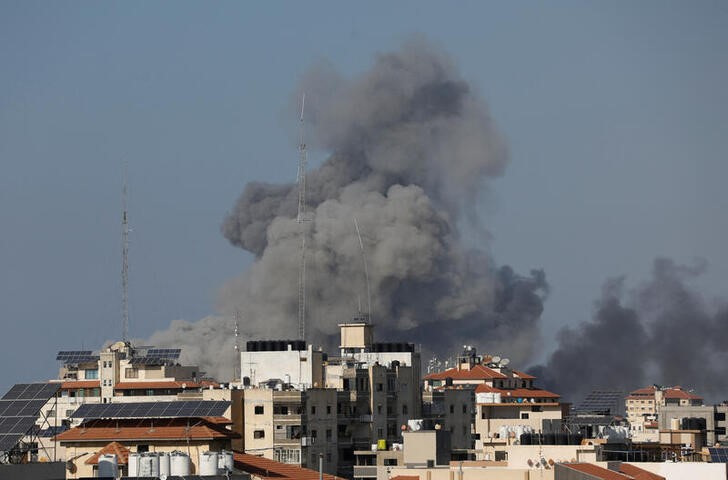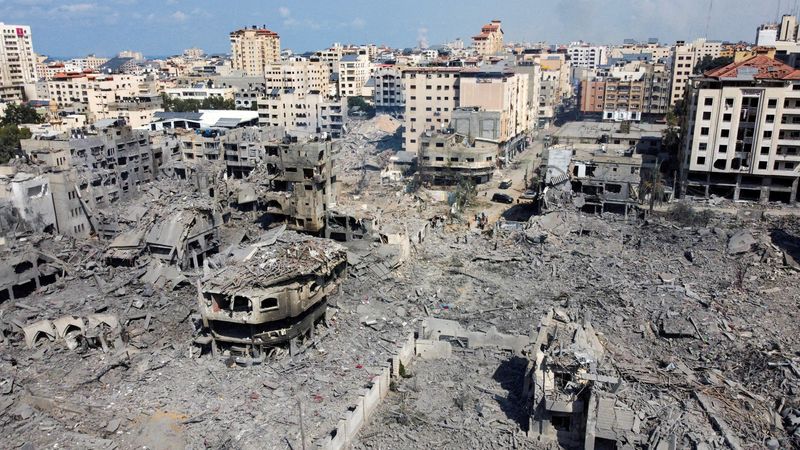By Henriette Chacar, Nidal al-Mughrabi and Humeyra Pamuk
JERUSALEM/GAZA/TEL AVIV (Reuters) -Gaza moved closer to a humanitarian catastrophe on Thursday as the death toll rose and vital supplies ran low, while Israel massed tanks on the enclave's border ahead of an anticipated ground invasion amid international calls for restraint.
Israel's government showed U.S. Secretary of State Antony Blinken and NATO defence ministers graphic images of children and civilians killed by Hamas, as it builds support for its response.
Blinken said they showed a baby "riddled with bullets," soldiers beheaded and young people burned in their cars.
"It's simply depravity in the worst imaginable way," he said. "It's really beyond anything that we can comprehend."
Israel has vowed to annihilate the Hamas movement that rules the Gaza Strip, in retribution for the deadliest attack on civilians in Israeli history, when hundreds of gunmen crossed the barrier and rampaged through towns on Saturday. Blinken has urged Israel to show restraint but reiterated America's support: "We will always be there by your side."
The head of the Israeli military, Lieutenant General Herzi Halevi, said lessons would be drawn from the security failures around Gaza that enabled the attack. "We will learn, investigate, but now is the time for war."
Israel's parliament approved Prime Minister Benjamin Netanyahu's emergency unity government late on Thursday, including a number of centrist opposition lawmakers, to display their determination to fight Hamas.
Public broadcaster Kan said the Israeli death toll had risen to more than 1,300. Most were civilians gunned down in their homes, on the streets or at a dance party. Scores of Israeli and foreign hostages were taken back to Gaza; Israel says it has identified 97 of them.
Israel has responded so far by putting Gaza, home to 2.3 million people, under total siege and launching by far the most powerful bombing campaign in the 75-year-old history of the Israeli-Palestinian conflict, destroying whole neighbourhoods. Gaza authorities said more than 1,400 Palestinians have been killed and more than 6,000 have been wounded.
Israel ministers suggest the start of an invasion is a matter of when not if.
The International Committee of the Red Cross (ICRC) said fuel powering emergency generators at hospitals in Gaza could run out within hours and the United Nations World Food Programme (WFP) warned food and fresh water were running dangerously low.
"The human misery caused by this escalation is abhorrent, and I implore the sides to reduce the suffering of civilians," ICRC regional director Fabrizio Carboni said.
Amid international calls for a ceasefire to allow in aid, Israeli Energy Minister Israel Katz said there would be no halt to the siege without freedom for Israeli hostages.
Egypt, which has a single border crossing with Gaza, said it was trying to get aid through there but this was hampered by Israeli bombardments.
WIDENING CONFLICT
In the biggest sign yet of the conflict potentially spilling across borders, Syria said Israeli air strikes had hit the airports in Damascus and Aleppo, putting both out of service. The Israeli military said it does not comment on such reports. Syria is a close ally of Iran, which sponsors Hamas and has celebrated the attacks while denying a direct role.
Lebanon's caretaker Prime Minister Najib Mikati said his country would lodge an urgent protest against Israel at the United Nations Security Council after Israel and powerful armed-group Hezbollah began exchanging fire across the Lebanese border.
The Israeli military says it has responded with artillery fire to launches coming from Lebanese territory.
Blinken will visit Jordan on Friday to meet King Abdullah and Mahmoud Abbas, head of the Palestinian Authority that operates limited self-rule in the Israeli-occupied West Bank.
Abbas, whose Fatah faction is a longstanding foe of Hamas, condemned violence against civilians on both sides on Thursday.
Scores of Israelis gathered in Jerusalem's Mount Herzl military cemetery on Thursday to bury their dead.
"When you didn't take my call, I knew you were fighting with all your power. When I realised you were missing, I could not imagine this is how it would end," one mourner said.
In Gaza's main southern city Khan Younis, where cemeteries were already full, dead were being buried in empty lots, like the Samour family, killed on Wednesday night in a strike that hit their house.
Palestinian rescue worker Ibrahim Hamdan drives from one bomb site to another as his team tries to pull survivors from houses destroyed by the Israeli air strikes.
"This war is harsh beyond imagining. They are collapsing people's buildings without warning. They knock down high-rise buildings on top of their residents," said Hamdan, who has worked through repeated wars since becoming a rescuer in 2007.
Blinken's plan to meet Abbas shows it is still mindful of Palestinian grievances, strongly felt by Arab allies.

Gazans, mainly descendants of refugees who fled or were expelled from homes in Israel at its founding in 1948, have suffered economic collapse and repeated Israeli bombardment under a blockade since Hamas seized power there 16 years ago.
Palestinian anger has mounted in recent months, with Israel carrying out the deadliest crackdown for years in the West Bank and its right-wing government talking of seizing more land. A peace process meant to create a Palestinian state collapsed a decade ago, which Palestinian leaders say left the population with no hope, strengthening extremists.
(Reporting Henriette Chacar, Dedi Hayun, Maayan Lubell and Emily Rose in Jerusalem and Nidal al-Mughrabi in Gaza, Emma Farge in Geneva, Jeff Mason in Washington and Reuters bureauxWriting by Peter Graff and Alexandra Hudson; Editing by Alex Richardson, Nick Macfie, Toby Chopra and Lisa Shumaker)
